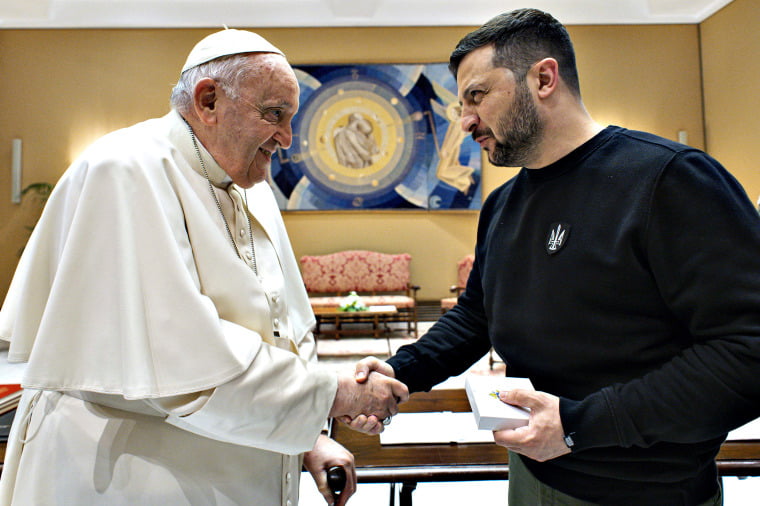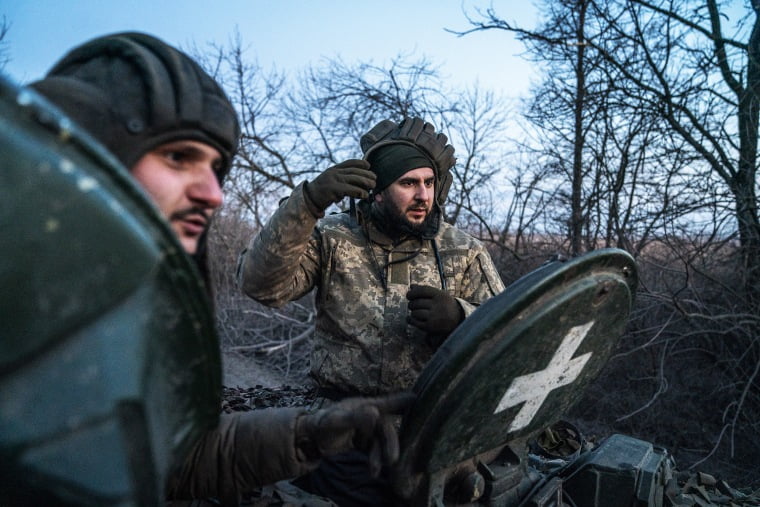In an indication of the strong reaction sparked by the remarks, Kyiv’s ambassador to the Vatican told NBC News on Monday that his nation could not accept the pontiff’s reasoning.
In Short
- Pope francis’ call for ukraine to negotiate an end to the war with russia sparks mounting fury and controversy.
- Ukrainian leaders and allies express outrage, rejecting the notion of capitulation and urging continued defense.
- The negative response from kyiv highlights the challenges of openly discussing peace talks while russia’s aggression persists.
TFD – Explore the mounting fury as Ukraine reacts to Pope Francis’ call for negotiation to end the war with Russia. Discover the critiques, challenges, and implications for Ukraine’s stance on peace talks in this heated controversy.
KYIV, Ukraine Ukraine and its allies have expressed mounting fury at Pope Francis’ suggestion that it should have the “courage” to negotiate an end to the war with Russia.
The pope’s remarks have not been the first to incite anger in Kyiv, and the ambassador of Kyiv to the Vatican told NBC News on Monday that his nation could not accept the pontiff’s reasoning. This comes at a dangerous time for Ukraine both in the war for public opinion and on the battlefield.
In an interview that was partially televised on Saturday, but was filmed last month, Francis stated, “You have to have the courage to negotiate when you see that you are defeated and that things are not going well.” He asked for Ukraine to possess “the courage of the white flag.”
Outraged Ukrainians responded right away.
“We fly a blue and yellow flag. This is our banner, by which we survive and thrive. In a post on X on Sunday, Ukrainian Foreign Minister Dmytro Kuleba stated, “We will never raise any other flags.”
Kuleba also criticized the Vatican for its “strategy” in the first part of the 1900s, seemingly in response to claims that the Catholic Church was silent on the Nazi atrocities during World War II. “I implore you to refrain from replicating the errors of the past,” Kuleba stated.
In his nighttime address on Sunday, President Volodymyr Zelenskyy delivered his own sly critique, accusing Francis—without identifying the pope specifically—of “virtually mediating” the dispute from a distance of thousands of kilometers.
“Ukrainians holding arms under the blue-and-yellow flag are the only thing stopping Russian murderers and torturers from marching farther into Europe,” Zelenskyy stated. “Russian shelling have burned and destroyed many of the white walls that once surrounded numerous homes and churches in Ukraine. This says a lot about who must give up in order for the war to cease.

Andrii Yurash, the ambassador of Ukraine to the Vatican, stated to NBC News that Kyiv was unable to understand that the attacker was being requested to fly the white flag rather than the victim. During the Second World War, Yurash stated over the phone from the Vatican, “Nobody was proposing to start peace negotiations to those who were suffering or fighting him or those who were enslaved by Hitler.” “Because a truce with Hitler meant death and suicide. In a same vein, a ceasefire with Putin means death and suicide.
In response to Francis’ remarks on Sunday, the Ukrainian Greek Catholic Church declared that Ukrainians “cannot stop defending themselves, because capitulation means their death.”
Critics included some of Ukraine’s closest allies. “Maybe, just to maintain equilibrium, we should push Putin to muster the bravery to pull his troops out of Ukraine?” Radosław Sikorski, the foreign minister of Poland, wrote on X. Without specifically mentioning the pope, NATO Secretary General Jens Stoltenberg also seemed to respond to his statements on Monday. “President Putin started this war and he could end it today but Ukraine does not have this option,” Stoltenberg said. “Surrender is not peace.”
Last year, Francis incited indignation by endorsing Russia’s imperial rulers—the historical justification that Putin frequently invokes to support his incursion. During the early months of the conflict, the pope also suggested that the Kremlin’s full-scale invasion of its neighbor might have been sparked by “NATO’s barking at Russia’s door.”
In an attempt to provide clarification, Vatican spokesman Matteo Bruni stated that the pope was repeating a phrase that was part of the interviewer’s question, which was “white flag.” Rather than Ukraine’s total capitulation, the pontiff favored “a cessation of hostilities, a truce reached with the courage of negotiation,” according to Bruni.
The negative response from Kyiv is indicative of its unwillingness to openly discuss peace talks as long as President Vladimir Putin holds office, even in the face of mounting evidence that its Western allies are growing weary of the war and may agree with the pope that Kyiv will eventually have to sit at the negotiating table.
This trend might pick up steam if former President Donald Trump takes the White House again, considering his cordial ties to Putin and his declared goal, if elected, of putting an end to the war in a day, without specifying how.

Since the beginning of the war, Moscow has openly advocated for peace talks, but only under circumstances that benefit the country. The lofty goal of regaining the Crimean Peninsula, which Russia has occupied, is implied by Ukraine’s repeated declarations that it wants to drive the Russian army back to its borders as they were in 1991, the year it earned independence.
The combat effort in Ukraine has been severely hindered in recent months by rising dissension among its supporters, frozen U.S. help, and ammunition shortages. Taking advantage of this, the Kremlin’s army has been steadily advancing on the battlefield.
Asked about Francis’ comments on Monday, Kremlin spokesman Dmitry Peskov said that Putin had also repeatedly talked about “our readiness and openness to solve our problems by way of negotiations,” but that Kyiv had rejected any possibility of talks.
Reports were provided by Yuliya Talmazan from London and Daryna Mayer from Kiev.
Conclusion
The controversy surrounding Pope Francis’ remarks underscores the complexities of negotiating peace in the midst of conflict. As Ukraine faces mounting pressure and criticism, the call for continued defense resonates strongly. The implications for future peace talks and international relations remain uncertain, highlighting the urgent need for dipl
Connect with us for the Latest, Current, and Breaking News news updates and videos from thefoxdaily.com. The most recent news in the United States, around the world , in business, opinion, technology, politics, and sports, follow Thefoxdaily on X, Facebook, and Instagram .
